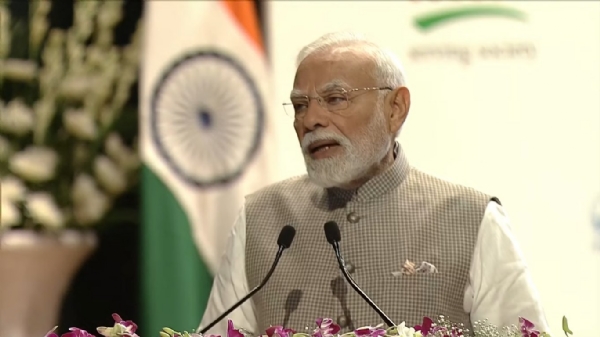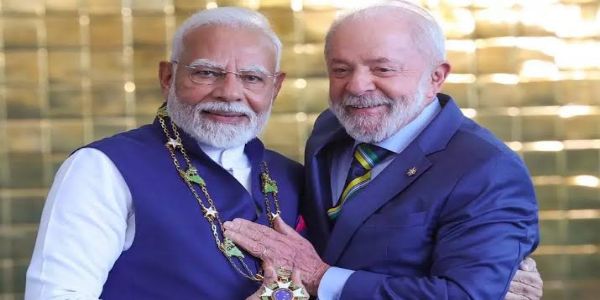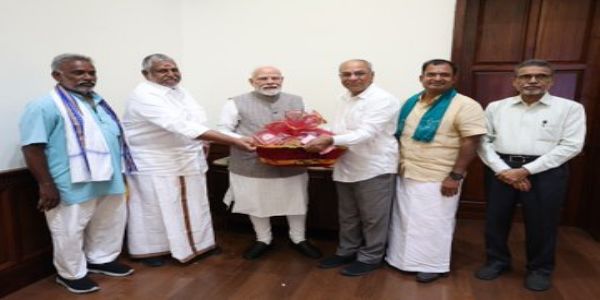
Delhi, 7 August (H.S.): Prime Minister Narendra Modi inaugurated the M.S. Swaminathan Centenary International Conference at ICAR PUSA in New Delhi, celebrating the centenary of Professor M.S. Swaminathan, a transformative figure in Indian agriculture and a key architect of the Green Revolution in India. The Prime Minister referred to Professor Swaminathan as a visionary whose work and ideals have significantly influenced food security in India, stating that his contributions will resonate for generations. PM Modi honored the legacy of Professor Swaminathan, recognizing him for converting scientific research into a tool for public service and for his passion for ensuring food security for the nation. He extended warm wishes to all present during the Swaminathan Birth Centenary Celebrations.
Alongside this commemoration, the Prime Minister acknowledged National Handloom Day, expressing gratitude to those in the handloom sector and noting the progress this sector has made over the last decade. He shared his personal experiences with Professor Swaminathan, recalling the difficulties in agriculture he observed while serving as Chief Minister of Gujarat. He highlighted the significance of the Soil Health Card initiative, founded with Professor Swaminathan's guidance, noting that his mentorship greatly influenced the initiative's success. Modi reminisced about visiting Professor Swaminathan’s Research Foundation Centre and his interactions with him over the years, emphasizing the importance of learning during their discussions. He paraphrased Professor Swaminathan's assertion that science should focus on delivery as much as on discovery, claiming that the professor embodied this principle in his work.
The Prime Minister recounted how Professor Swaminathan’s efforts went beyond boosting grain production — he also advocated for environmental conservation and the reduction of chemical use in agriculture. He highlighted the concept of the Evergreen Revolution proposed by Swaminathan, which sought to harmonize food production with ecological balance, along with the concept of Bio-Villages aimed at empowering rural communities. Among other innovative ideas were Community Seed Banks and Opportunity Crops, which Swaminathan championed to enhance agricultural resilience.
Highlighting the relevance of biodiversity in today's agricultural dialogue, Shri Modi brought attention to Professor Swaminathan's introduction of biohappiness, advocating for sustainable practices that improve livelihoods through local resources. He underscored Swaminathan's commitment to ensuring that scientific innovations reached the grassroots level, thereby benefiting smallholder farmers, fishermen, and tribal communities.
Moreover, the Prime Minister announced the launch of the M.S. Swaminathan Award for Food and Peace, intended to honor individuals from developing countries for their contributions to food security. He articulated the practical connection between food security and peace, emphasizing the need to respect and uphold the sanctity of food, which is essential for life itself. Highlighting that food crises threaten lives and can lead to broader social unrest, he positioned the award's significance in today’s geopolitical landscape. The first recipient, Professor Adenle from Nigeria, was commended for exemplifying the spirit of food security.
The Prime Minister expressed optimism about India's agricultural achievements, noting that India now leads in milk and pulses production, is second in rice, wheat, cotton, fruits, and vegetables, and has reached its highest levels of food grain output. He reaffirmed the government's commitment to prioritize farmers' welfare and pursue their prosperity relentlessly. According to him, the government’s policies focus on increasing farmers' income, alleviating their financial burdens, and diversifying their revenue sources. Initiatives such as the PM-Kisan Samman Nidhi provide direct financial support to farmers, while insurance programs like PM Fasal Bima Yojana help combat agricultural risks.
PM Modi emphasized that the foundational strength of the nation lies in its farmers, and recent policy formulations are aimed at instilling confidence within the farming community rather than mere assistance. The establishment of 10,000 Farmer Producer Organizations (FPOs) has aimed to consolidate the strength of small farmers, while digital platforms like e-NAM have enhanced market access for agricultural produce. The PM Kisan Sampada Yojana supports the development of food processing and storage facilities, while efforts are being made to uplift underperforming agricultural districts through schemes like PM Dhan Dhanya Yojana.
In discussing future goals, the Prime Minister emphasized that India's journey towards becoming a developed nation hinges on collective contributions across various sectors. He called upon India's scientific community to advance nutritional security alongside historical achievements in food security, urging an emphasis on bio-fortified crops and a reduction in chemical usage. He insisted on promoting natural farming practices, arguing for immediate and proactive measures to combat climate change challenges through research and development of climate-resilient crops.
Shri Modi also stressed the importance of solar-powered micro-irrigation systems, calling for the greater integration of technology in agriculture. He posed essential questions regarding the integration of satellite data, artificial intelligence, and machine learning in agricultural systems, promoting ideas for innovative solutions to predict yields, monitor pests, and optimize agricultural practices.
In reiterating the commitment to achieving a developed nation status by the 21st century, the Prime Minister highlighted the framework of inclusive progress and the essential roles various societal components must play in creating a sustainable and prosperous agricultural landscape in India. This vision is deeply rooted in the legacy of Professor Swaminathan, as the Prime Minister concluded with aspirations for enhanced agricultural practices and research efforts guided by the principles laid out by the revered scientist.
---------------
Hindusthan Samachar / Jun Sarkar








